
Ryan Griffin-Stegink
Is “resiliency” just the new “sustainability?” That question was on a lot of minds as we all sat down at MPC’s latest roundtable on the concept of resilient cities and what that means for planning. On Wednesday, May 15, we brought in experts from academia, a private utility and a government agency to have a robust discussion about the many facets of resiliency planning. If you missed the roundtable, be sure to check out the full video recording of the event, photos from the event and the presentation for download.
Resiliency has been in the news quite a bit in the past year with all the crises—weather, financial, security, health or otherwise—that we’ve had, and especially so recently with pieces in the New Yorker, the Atlantic Cities and the Huffington Post, culminating in an announcement by the Rockefeller Foundation on its hundredth anniversary about their 100 Resilient Cities Centennial Challenge (more on that in a sec). So what exactly is resiliency all about? Can it be more than just the trendy planning term of the moment?
When it comes down to it, planning for resilient cities is simply good planning, something that MPC has been working on for nearly 80 years. The momentum behind the term and forums like our roundtable, however, provide a great way to help the wider public understand the importance of planning and integrating everything from hard infrastructure to futuristic technology to strong social cohesion. As Andrew Zolli, a leading thinker on resilience, defined it in a recent Atlantic Cities interview with Richard Florida and Jonathan Rose, resiliency is “the ability to maintain core purpose, with integrity, under the widest variety of circumstances. More broadly, it’s the ability to recover, persist or even thrive amid disruption.” Planning resilient cities is not just about prevention—how do we anticipate future storm sizes and build better infrastructure?—it’s really about, as Zolli defines it, continuity and recovery in the face of rapid change.
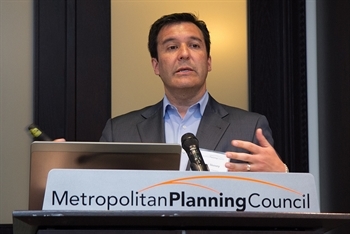
"Resiliency is just good planning." - Peter Skosey
These issues were all discussed at the roundtable. MPC Executive Vice President Peter Skosey kicked it off by helping us frame the issue and how it relates to MPC’s work. While describing a few examples of MPC’s work on stormwater mitigation, Bus Rapid Transit and water supply management as they relate to making cities more responsive and flexible, Peter brought up the inherent contradictions and tradeoffs embedded in the concept of resiliency. Resilience means efficiency, but also redundancy. For example, with transit shutdowns, like last week’s Red Line derailment or the current Red Line south reconstruction, the system is more resilient if there are multiple ways for people to get around. Resiliency is both hard—physical systems—and soft—finance and management systems, governance and social structures—infrastructure. It’s both smart—technology and data—and dumb—passive and functional default modes.
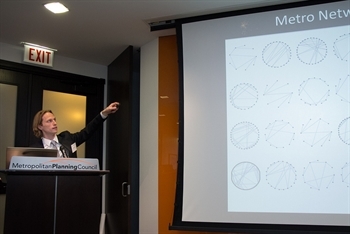
Sybil Derrible, UIC, lays out the groundwork for the concept of resiliency.
Our first guest, University of Illinois at Chicago (UIC) Assistant Professor Sybil Derrible gave us the theoretical context for our discussion. According to Sybil, “resiliency” goes beyond “sustainability” because it moves beyond balancing the triple-bottom line in the present to thinking about how to maintain that over time. He gave a great, but quick, overview of the key concepts of urban resilience, including the ability to recover from perturbations, centralized versus decentralized networks and, adding to Peter’s list of contradictions, the both formal—institutional preparedness and planning—and informal—citizen-led, improvisational and ad hoc—nature of urban resilience. Resilience is about the ability to resist disorder and minimize entropy. For Sybil, solutions include better understanding the way cities work, including complex networks, better integrating resilience into standard planning practices and doing scenario planning. Sybil closed out his presentation by showing us a drawing of a sustainable city that one of his students made and emphasizing the point that when we think about resilience and future cities, we often think science fiction, but what we really want is livable cities.
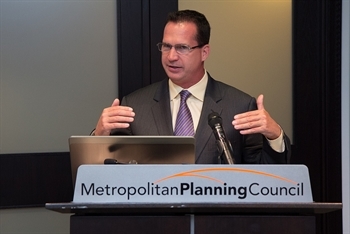
Tyler Anthony, ComEd, explains the role of resiliency in utility infrastructure.
Next up to talk about the private sector and physical infrastructure side of resilience was J. Tyler Anthony, Senior Vice President at ComEd, also our sponsor for the roundtable. Tyler again emphasized that resilience is all about planning. The old model of utilities reacting to outages and problems is replaced with using data and technology to strategize and plan for a more adaptive system. Recently, ComEd has undertaken a $2.6 billion investment in an updated smart grid system, including $1.3 billion in infrastructure improvements and the rest for technology. Part of a more resilient system means giving customers the ability to report electricity outages by text message and social media to get better information and to improve communications. As part of this, ComEd is getting into dimensionalized responses, which involves asking communities ahead of time to strategically prioritize which parts of their electric grid should be repaired first, a concept which fits well with MPC’s work on strategic, data-driven investments.
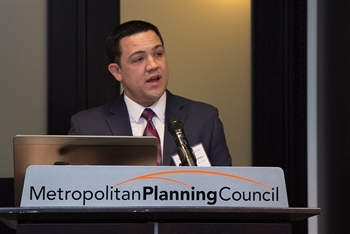
Stephen Konya, Ill. Dept. of Public Health, ties social infrastructure and public health into the resiliency discussion.
Finally, to provide the public sector and social infrastructure perspective, our final speaker was Stephen Konya, Chief of Staff at the Illinois Dept. of Public Health (IDPH). Stephen described a joint effort between IDPH and UIC called BRACE, Building Resilience Against Climate Effects. Resilience goes beyond just infrastructure and technology, but is really about how those things affect people and their health. Stephen explained the wide range of public health impacts that fall under his purview and how those need to be integrated into adapting to climate change. Resilient cities don’t just know how to respond to disasters, but also the slow motion daily impacts of crises like climate change and disease.
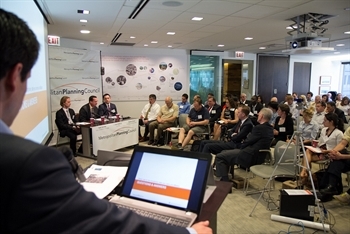
The audience and panelists took part in a robust discussion of what exactly resiliency looks like.
We saved a lot of time at the end for questions for the speakers and discussion with the audience. A number of key issues came up. There’s a tendency to look at our governments to do all the resiliency planning and emergency preparedness, but real resilience requires design for chaos or “improvised response.” When large centralized systems fail, the most resilient communities bounce back in part because of their strong citizen engagement and social networks. Kevin Brubaker from the Environmental Law & Policy Center brought up community building and the example of how his wife made soup for neighbors during a storm or how after Hurricane Sandy, people shared their power outlets to charge cell phones. There’s a need for robust government and planning for the good times, but to really be resilient, strong social ties within local communities is critical for the bad times. Chief Technology Officer for the City of Chicago, John Tolva, was in the audience and added comments on how citizens can help create small feedback loops. He used the example of the City’s preparations for the NATO protests, and how they were able to get more information from social media than their own security cameras.
Then there’s the difficult question of how to know whether we’re doing a good job of planning for resiliency. Sybil indicated that unfortunately, we’re still struggling with performance metrics for that and the need for network optimization. Stephen mentioned that a lot of the important work that needs to happen is embedded in mundane things like updating outdated codes, and often, government knows it’s doing a good job when no one knows about the problems.
Now, back to the Rockefeller Foundation’s 100 Resilient Cities challenge, an effort to fund 100 cities to do three main things: hire a Chief Resilience Officer to oversee the development of a resilience strategy, create a resilience plan, including tools and resources for implementation, and be part of a network of cities doing this resiliency work. President of the Rockefeller Foundation, Dr. Judith Rodin wrote in the Huffington Post that a resilience plan requires the flexibility to change and evolve in the face of disaster; diversity and redundancy which enables the system to function even when individual parts fail; options for safe failure that limits shocks rippling across systems; the ability for rapid rebound to re-establish function quickly; and robust feedback loops that sense and allow new options to be introduced quickly as conditions change. While some might wonder if a separate resilience plan and staff person are necessary or whether they should be integrated into the regular plans and processes, the challenge provides a good opportunity to help cities focus on and finance good, robust planning. We definitely hope that Chicago takes advantage of this, and we especially hope that our region's suburbs can build on existing interjurisdictional collaborations to work together to apply for this support.
We’re glad to provide a forum to ask these difficult questions and we thank our three panelists for a great discussion to get us thinking about the complexity of resilience, but also the back-to-the-basics nature of good planning. We look forward to thinking more of how to incorporate this into our work and to provide opportunities for discussions on this topic in the future. Tell us what you think: what did you think about our roundtable or what are your thoughts on the concept of resiliency?